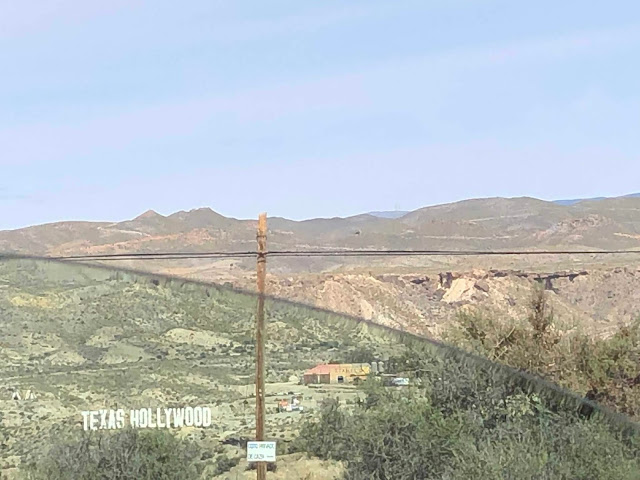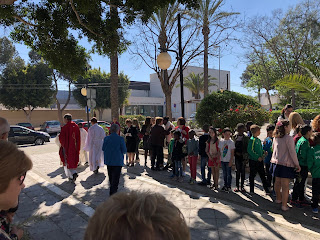Meeting God in Vulnerable Places
I preached today at mid-day prayer on the gospel passage Luke 17:11-19.
As Jesus continued his journey to Jerusalem,
he traveled through Samaria and Galilee.
As he was entering a village, ten lepers met him.
They stood at a distance from him and raised their voice, saying,
"Jesus, Master! Have pity on us!"
And when he saw them, he said,
"Go show yourselves to the priests."
As they were going they were cleansed.
And one of them, realizing he had been healed,
returned, glorifying God in a loud voice;
and he fell at the feet of Jesus and thanked him.
He was a Samaritan.
Jesus said in reply,
"Ten were cleansed, were they not?
Where are the other nine?
Has none but this foreigner returned to give thanks to God?"
Then he said to him, "Stand up and go;
your faith has saved you."
My preaching follows:
Today’s story hinges on the experience of a leper – his encounter with
God, being healed, and returning to thank Jesus.
Scholars tell us that leprosy in the first century was not the leprosy
we know today, Hansen’s Disease, but rather a skin ailment that resulted in
discoloration. In the first century, a
leper was considered unclean and therefore was separated from society, isolated
from friends and family until the time when he or she was healed and the
leprosy removed. Imagine, then, the
effect of being healed from leprosy. In
this case, healing is a reconciliation, a reunification of the leper with the
community and an end to the stigma and isolation. The one healed leper who returns to thank
Jesus must recognize the profound change that has overcome him, both physically
and socially. Once vulnerable, he is now
returned to society a changed man. He
goes back to Jesus, praises God in a loud voice, and falls on the ground in
adoration of the One who Heals.
Just as the leper met God in his
vulnerability, so also that is where we find God. No one here is a leper, but certainly all
human life is marked by vulnerability. Perhaps it comes from serious illness, or from
worry over the illness of a loved one.
Or maybe we are vulnerable because of recent life changes – getting
married or having a child, moving to a new city, or losing a job. Maybe our vulnerability arises out of loss
and mourning. At this time of year, it
could just be the ordinary anxiety of the end of the semester or of the coming
holiday season. Whatever the cause,
vulnerability opens us profoundly to God’s healing transformative touch.
The theologian Sarah Coakley speaks of prayer itself as
vulnerability—being open so that God can speak in us, and allowing God’s voice
to transform us in unexpected ways. She
tells of how she was transformed as a theologian profoundly simply by silent
prayer. God found her in that silence,
and her theological voice was changed. Each one of us here has at one time or
another opened our hearts in silent vulnerability to God’s transforming
call. Some here have heard the call to
religious life, or to be a parent, to teaching, preaching, or service. Perhaps in our vulnerability we were touched
by God – healed – so that we might heal others.
It seems like this is a bit about
control. Maybe we had already planned
our life when God spoke in our silence. When
we are vulnerable, we are not in control of what happens to us. The most vulnerable in our society, children,
the elderly, the sick, must live without being in control of their
circumstances or surroundings, and sometimes even of their own bodies. We want to control God, too. We want God to be there when we seek comfort,
and to bless us when we do what we want God to call us to. It doesn’t always work like that, though God
certainly wants us to be our best unique selves and to be happy. In our relationship with God, we are not in
control, and we are least in control when we think we are most in control.
But, really, we do not control any
of our relationships. Each one of them must
be a place of vulnerability, where we open ourselves to be known and changed by
another person. Anytime we love another
person, any time we open ourselves to the love of another, we are letting go of
our control, allowing another to shape and transform us in unexpected
ways.
The leper returns to give glory to
God loudly (as Luke says). Jesus
responds to the leper at his feet, saying, “Stand up and go; your faith has
saved you.” We hear him say this many
times in the Gospels, to the flocks who come seeking healing. Each one is healed by faith.
Allowing ourselves to be vulnerable
requires faith in our loved ones and in our God, that they will allow us to be
ourselves, that they will be vulnerable too, and that they will heal us rather
than harm us. Like the leper, we respond
to God’s healing by giving thanks for all that we have received. Next week, we celebrate Thanksgiving, and as
we do every year, we remember the gifts we have been given – the food on our
table, the love of our families, the companionship of our communities, our good
health and healing. These are our
memories of God’s fidelity to us, a way for us to strengthen the faith it takes
to become vulnerable again and again, to God and to the people we care about. In thanksgiving, we may also remember the
hardships, the times that bring what we have into sharp relief—the times of
illness and suffering, of mourning and loss.
We remember that God comes to us in our times of trial, stands with us,
and provides for our every need.
Jesus tells us, with the leper, to
Stand Up and Go, saved by our faith, transformed by God’s grace, to glorify God
in all that we do.
(Note: the article I most recently read by Sarah Coakley, and which contains this theme of the vulnerability of prayer, is "Prayer as Crucible: How My Mind Has Changed," in Christian Century, March 22, 2011, pages 32-40. I highly recommend it!)




Comments